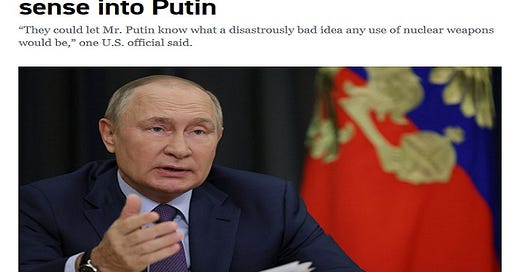It's unrealistic to expect either of them to agree to US officials’ latest divide-and-rule plot, which is aimed at sowing the seeds of distrust between Russia and each of its top Asian Great Power partners simultaneously with manipulating its public’s perceptions per America’s self-admitted infowar against that newly restored world power.
Politico cited unnamed US officials to report that “Calls grow for China and India to talk sense into Putin”. Their piece concerns the ongoing efforts to pressure those two Asian Great Powers’ leaders into tacitly threatening to distance themselves from Russia if that newly restored world power is forced to employ tactical nukes in self-defense as an absolute last resort to defend the Novorossiyan regions that it just reunified with from an overwhelming NATO-backed but Ukrainian-fronted invasion force.
This policy is predicated on an inaccurate assessment of the implied concerns/questions that President Xi and Prime Minister Modi conveyed to President Putin during mid-September’s SCO Summit in Samarkand. Neither – and especially not the Indian leader like was falsely claimed by many – expressed any public criticism of Russia’s special operation, and the issues that they wanted to discuss with their counterpart were certainly very reasonable and aimed at better understanding the conflict’s dynamics.
Nevertheless, American officials evidently interpreted their side’s twisted version of events in a way that allegedly implied credence to their divide-and-rule policy, which speaks to how information warfare narratives recycle through the ecosystem to sometimes ultimately mislead those that are behind them. On the topic of infowars, it also deserves mentioning that the former chief of the Pentagon’s spy agency recently boasted about the means through which the US is waging this against Russia.
According to him and his co-author, their declining unipolar hegemon’s new approach is to manipulate Russians’ “nationalist” sentiment. To that end, the policy reported upon by Politico makes perfect sense since it’s intended to artificially manufacture the conditions – if not the perceptions simply by the policy being reported upon in the first place – in which the former Soviet superpower has now supposedly been reduced to taking orders from rising Asian Great Powers out of pure economic desperation.
Those selfsame conditions are unrealistic to create, but the optics thereof have already been shaped through Politico’s article despite being unbelievable among objective observers and the Russian public alike. The reason why the US’ latest policy is doomed to fail is because it completely ignores its targets’ national interests. Even though China tacitly complies with the anti-Russian sanctions, it won’t stop purchasing non-sanctioned Russian resources even if they’re eventually sanctioned in the future.
That’s because submitting to such pressure would simultaneously harm its direct interests of obtaining cheap and reliable access to them (including for stockpiling strategic reserves) while also harming its indirect ones related to worsening Russia’s budgetary difficulties that could in turn gradually erode its wherewithal to withstand the US-led Western proxy onslaught through Ukraine. Both outcomes are detrimental to the international structural stability that Beijing aims to achieve.
As for India, it’s already proven its reliability to Russia by serving as its partner’s irreplaceable valve from Western pressure in order to preemptively avert Moscow’s potentially disproportionate dependence on China. More insight into Indian grand strategy in this respect can be read in the analyses enumerated here, which can be summarized as Delhi being driven by a desire to become the kingmaker in balancing Eurasia amidst the present Age of Complexity that was accelerated by recent events.
If Russia were to be coerced by the West into being China’s “junior partner” out of pure economic desperation, then the People’s Republic would gain a major edge over the US in the long term, which would in turn compel India into becoming America’s “junior partner” to balance it all out. Likewise, if Russia were to weaken to the point of “Balkanization”, then the US would gain a major edge over China in the long term. Therefore, India and China both have grand strategic reasons not to “isolate” Russia.
With these driving forces in mind, it’s thus unrealistic to expect either of them to agree to US officials’ latest divide-and-rule plot, which is aimed at sowing the seeds of distrust between Russia and each of its top Asian Great Power partners simultaneously with manipulating its public’s perceptions per America’s self-admitted infowar against that newly restored world power. China and India are thus expected to preserve their strategic ties with Russia even if Moscow is forced to use tactical nukes in Ukraine.





Politico has all the credibility of BuzzFeed, HuffPost, NPR, TIME magazine, and the ATLANTIC. It's best to pretend that the State-Sponsored media does not exist.
Except for the most WOKE, everyone realizes that the USA sabotaged that pipeline and that everything we read in the USA are psy-ops aimed at creating a war before the Republicans gain control of congress in less than four months.